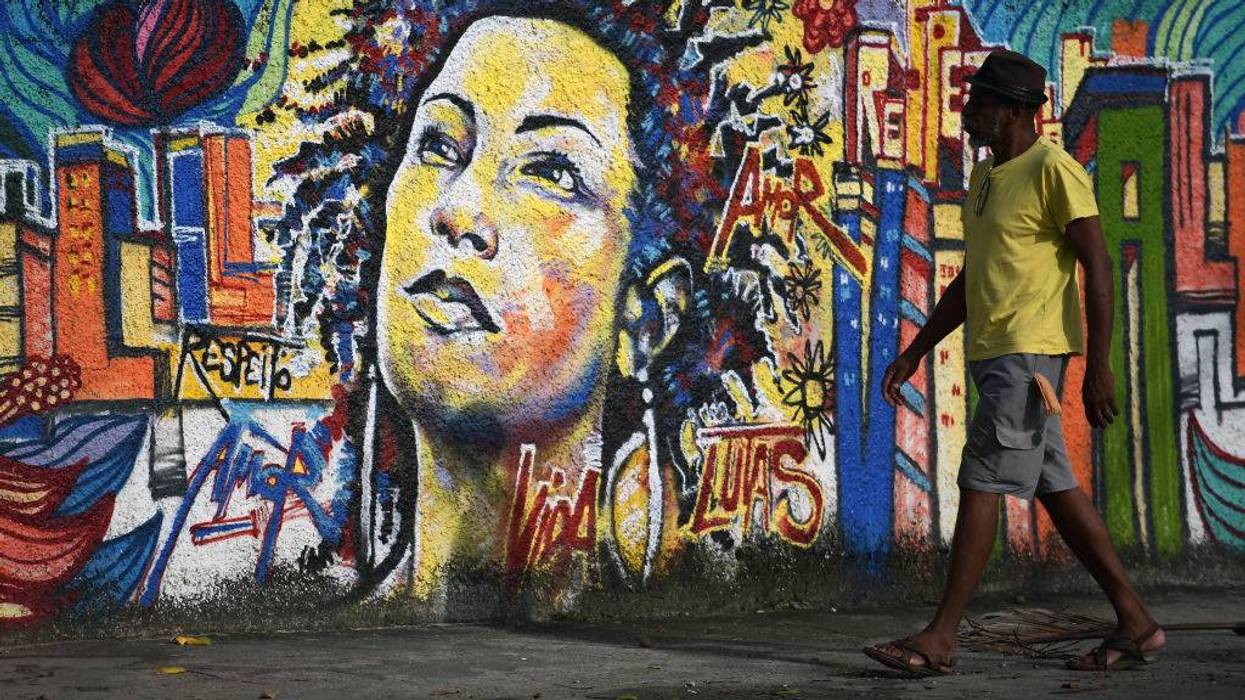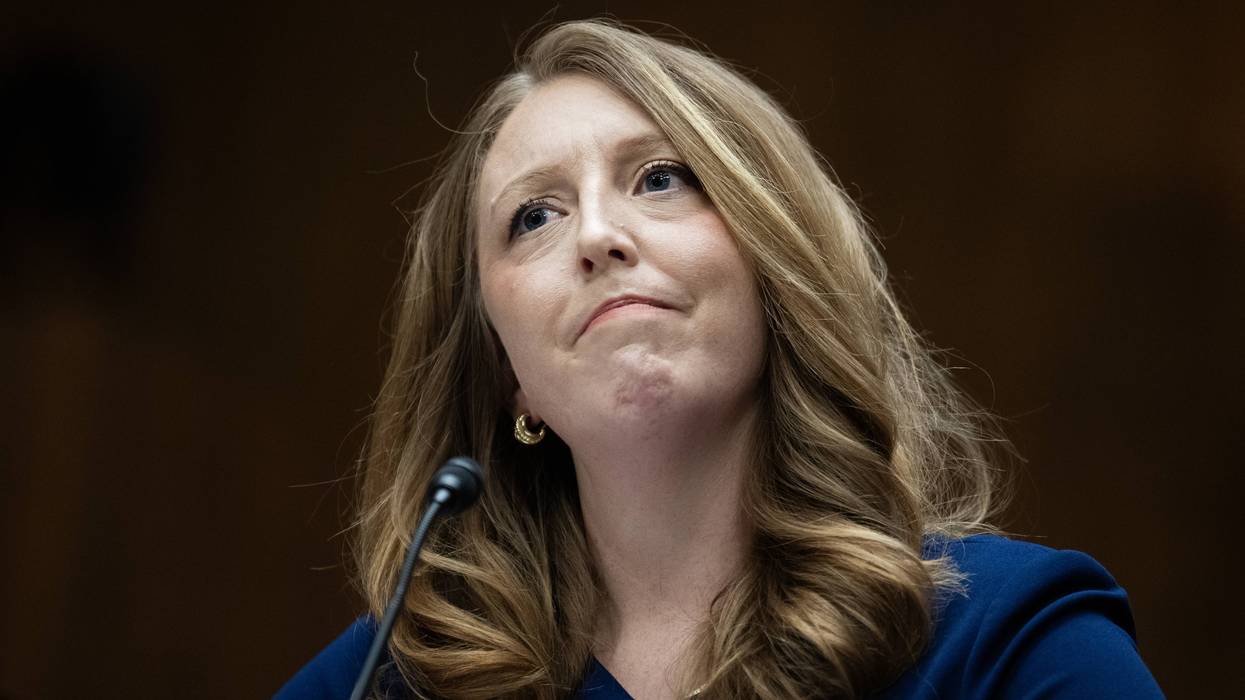June, 16 2022, 04:16pm EDT

Stand Up America: Today's Hearing Shows How Close America Came to Brink of Autocracy
Today, the January 6 Select Committee interviewed witnesses and presented evidence showing that former President Trump illegally pressured his Vice President, Mike Pence, to reject the results of the 2020 election.
Stand Up America's Executive Director Christina Harvey issued the following response:
WASHINGTON
Today, the January 6 Select Committee interviewed witnesses and presented evidence showing that former President Trump illegally pressured his Vice President, Mike Pence, to reject the results of the 2020 election.
Stand Up America's Executive Director Christina Harvey issued the following response:
"For almost three hours, the January 6 Committee provided a chilling look at President Trump's criminal campaign to pressure Vice President Pence into overturning the 2020 election. He pressured, badgered, and ultimately threatened Pence via tweet in a desperate attempt to stop the electoral count and overturn the will of voters. In case Vice President Pence refused, Trump's supporters erected a hangman's noose on U.S. Capitol Grounds.
"After today's hearing, it's apparent how close we came to even greater bloodshed and the brink of autocracy."
Stand Up America is a progressive advocacy organization with over two million community members across the country. Focused on grassroots advocacy to strengthen our democracy and oppose Trump's corrupt agenda, Stand Up America has driven over 600,000 phone calls to Congress and mobilized tens of thousands of protestors across the country.
LATEST NEWS
Former Brazilian Political Officials Found Guilty of Plotting Murder of Marielle Franco
"What the killers did not expect is that her legacy would become greater than all of this," said Brazilian Supreme Court Justice Carmen Lúcia.
Feb 25, 2026
A five-judge panel on Brazil's Supreme Court on Wednesday voted unanimously to convict former Congressman Chiquinho Brazão and his brother, politician Domingos Brazão, of ordering the 2018 murder of Rio de Janeiro City Councilwoman Marielle Franco and her driver, Anderson Gomes.
As reported by Reuters, the court sentenced the Brazão brothers to each serve 76 years in prison for plotting to assassinate the 38-year-old Franco because they feared she and her allies in the Socialism and Liberty Party would be an impediment to their illegal scheme that involved taking public lands to develop private real estate projects.
Justice Alexandre de Moraes, who oversaw the trial of the brothers, said that the two men did not think they would be held accountable for killing Franco because she was a Black woman who represented a poor neighborhood in Rio.
"Inside the misogynistic, prejudiced minds of those who ordered and carried out the crime, who would care about that?" Moraes said. “They did not expect such wide repercussions."
Justice Carmen Lúcia also said that the Brazão brothers seemed to believe that they would be allowed to get away with murder.
"What the killers did not expect," said Lúcia, "is that her legacy would become greater than all of this."
The court also sentenced former Rio de Janeiro Police Chief Rivaldo Barbosa to an 18-year prison sentence for obstructing the investigation into Franco's murder.
Franco's widow, current Rio City Councilwoman Mônica Benício, told Payday Report that the court's conviction of the plotters was a landmark decision for Brazilian democracy.
"For the country, this is an opportunity to demonstrate its capacity to break with the selective penal system that protects criminal structures and their political ties," Benício said. "We must learn a lesson from what the assassination of Marielle and Anderson reveals about Brazil: the obscure connections between crime, politics, and the police."
Anielle Franco, a sister of Marielle Franco who currently serves as Brazil's Minister of Racial Equality, hailed the verdict as "justice" in a social media post, vowing that "our fight continues for all victims of violence."
Agnes Callamard, secretary general of Amnesty International, said that justice for Franco and Gomes was "a long time coming," and added that "their killings are emblematic of the broader and highly alarming trend of lethal violence and structural racism against human rights defenders in Brazil."
Keep ReadingShow Less
Trump's Surgeon General Nominee Dodges Senators' Questions on Vaccines, Conflicts of Interest
"Means is another example of President Trump nominating someone with financial conflicts instead of qualifications," said one consumer advocate.
Feb 25, 2026
The US Senate's confirmation hearing for Casey Means, President Donald Trump's nominee to be the next US surgeon general, showcased "just how profoundly unqualified" the wellness influencer is to serve as the nation's top doctor, said one consumer advocate after Means dodged questions about her potential conflicts of interest, refused to affirm that anti-vaccine conspiracy theories have been debunked, and spread misinformation about contraception.
Means was nominated to the role on Health and Human Services Secretary Robert F. Kennedy Jr.'s recommendation, and her lack of a current medical license would make her an outlier among past surgeons general. Her license lapsed in 2024, and she did not finish her medical residency at Oregon Health and Science University, leaving in 2018 just months before she was set to complete it because, as PBS NewsHour reported last year, "she came to view the healthcare system as exploitative."
Means then became a self-described "metabolic health evangelist" and a social media wellness influencer, sharing a newsletter with her hundreds of thousands of followers to whom she marketed health products and supplements and earning tens of thousands of dollars in income doing so.
She is also the co-founder of a company called Levels, which offers a subscription for wearable glucose monitors—and which could benefit from Kennedy's endorsement of wearable medical devices.
Means signed a government ethics agreement last September stating she would resign from her advisory position at Levels and stop promoting wellness products for income, but Democrats on the Senate Health, Education, Labor, and Pensions (HELP) Committee, including Sen. Chris Murphy (D-Conn.), had questions about Means' recent potential conflicts of interest.
Murphy noted that Means failed to disclose her financial interests numerous times when promoting her lab testing platform, Function Health; Genova Diagnostics, another testing company that she sponsored; and Zenbasil seeds, a supplement that she recommended in her newsletter and whose maker she had a financial partnership with.
"This seems systemic," said Murphy. "It seems that in a majority of instances in which you were, as a medical professional, recommending a product, you were hiding the fact that you had a financial partnership."
Means responded by accusing Murphy's staff of "intentionally" mischaracterizing the data about her disclosures.
damn, Trump's surgeon general nominee Casey Means is a transparent bullshitter even by the standards of the regime. Watch how she's tries to blame Chris Murphy's staffers for the fact he has her dead to rights on being dishonest and corrupt.
[image or embed]
— Aaron Rupar (@atrupar.com) February 25, 2026 at 11:28 AM
"Means is another example of President Trump nominating someone with financial conflicts instead of qualifications—elevated precisely because of her opposition to the best science and fundamental public health principles," said Robert Weissman, co-president of government watchdog Public Citizen. "We need a surgeon general who understands that public health is, fundamentally, about taking care of each other, not leaving each of us to go it alone."
Considering Means' background, he added, "it is clear that Means will not push back on Trump and RFK Jr. as they put profits ahead of patients and anti-science views ahead of sound public health information. The already broken US healthcare system has been made much worse by Trump and his allies, who have gutted important health agencies and made dangerous cuts to health programs to fund tax cuts for billionaires."
“Casey Means has no place as US surgeon general, and every senator should reject her absurd nomination," said Weissman.
As in Kennedy's confirmation hearing last year, a number of questions from senators were related to Means' views on vaccination. Like the HHS secretary, during her career Means has expressed skepticism about immunization despite scientific studies and decades of evidence that have shown vaccines against diseases like polio and measles have prevented millions of deaths and amounted to some of the most successful public health interventions in history.
On Joe Rogan's podcast in 2024, Means allowed that "one vaccine probably isn’t causing autism" but asked, "What about the 20 that they’re getting before 18 months?”
There is no evidence that the childhood vaccine schedule in the US leads to autism. The increased number of vaccinations children receive today compared to the 1980s and '90s is frequently cited as a concern among vaccine skeptics, but the Children's Hospital of Philadelphia's Vaccine Education Center notes that the "immunological components in vaccines has dramatically decreased" due to "scientific advances in protein chemistry and protein purification that have allowed for purer, safer vaccines."
Means said Wednesday that "anti-vaccine rhetoric has never been a part of my message," but refused to answer several direct questions about immunization.
Sen. Bill Cassidy (R-La.), a physician, asked Means whether she would encourage Americans to be vaccinated against the flu.
Means replied that patients should "have informed consent with their doctor before getting any medication" and said that "vaccines save lives," but did not confirm whether she would endorse the flu vaccine.
CASSIDY: Would you encourage Americans to take the flu vaccine?
CASEY MEANS: I do think it's important as a physician and to rebuild trust in public health to make sure patients are encouraged to have informed consent with their doctors before getting any medication pic.twitter.com/b5JhGUMs5R
— Aaron Rupar (@atrupar) February 25, 2026
She also would not say whether she would recommend the measles vaccine as surgeon general. Nearly 1,000 children have been sickened with the highly contagious, preventable illness in South Carolina, and two children died of measles in West Texas last year, with the outbreaks spreading among the unvaccinated population in the affected areas.
"Would you encourage mothers to vaccinate their children with the measles-mumps-rubella vaccine, seeing how we've had children die?" asked Cassidy.
Means again said only that she is "supportive" of the vaccine but continued to focus her reply on the idea that parents should have "a conversation" with their doctor about immunization against deadly diseases.
Dr. Casey Means, Trump's nominee for surgeon general, won't unambiguously say that mothers should have their kids vaccinated against measles: "I do believe that each mother needs to have a conversation with their pediatrician about any medication they're putting in their… pic.twitter.com/tiqYv7eeAD
— Aaron Rupar (@atrupar) February 25, 2026
Angela Rasmussen, a virologist and Defend Public Health member, said Means' "only apparent qualification for the job of surgeon general is her willingness to promote RFK Jr.’s disinformation and quackery.”
Epidemiologist Elizabeth Jacobs, a member of the group's coordinating committee, added that "the leading US government voice on public health issues... must be someone Americans can trust to give credible advice based on solid science and real data, not a charlatan who specializes in selling expensive, unproven tests and treatments."
"It's time for the Senate to grow a backbone and say, 'Enough!'" said Jacobs, "starting with Casey Means."
Keep ReadingShow Less
Four People on Florida Speedboat Killed in Shootout With Cuban Troops
"This is going to be a shitshow," one social media user said of the deadly encounter, which occurred amid high tensions with the Trump administration.
Feb 25, 2026
This is a developing story… Please check back for updates…
In a deadly development that could further strain relations between Havana and Washington DC, Cuba's Ministry of the Interior announced Wednesday afternoon that four people on a Florida-registered speedboat were killed in a gunfire exchange with Cuban troops in the island nation's territorial waters.
The boat, "with registration number FL7726SH, approached up to 1 nautical mile northeast of the El Pino channel, in Cayo Falcones, Corralillo municipality, Villa Clara province," Cuba's ministry said in a statement shared on social media. When a five-member crew of border troops "approached the vessel for identification, the crew of the violating speedboat opened fire on the Cuban personnel, resulting in the injury of the commander of the Cuban vessel."
"As a consequence of the confrontation, as of the time of this report, four aggressors on the foreign vessel were killed and six were injured," the ministry said. "The injured individuals were evacuated and received medical assistance. In the face of current challenges, Cuba reaffirms its determination to protect its territorial waters, based on the principle that national defense is a fundamental pillar of the Cuban state in safeguarding its sovereignty and ensuring stability in the region. Investigations by the competent authorities continue in order to fully clarify the events."
The New York Times reported that "a US official initially said the firefight had involved a US civilian boat that was part of flotilla to get relatives out of Cuba, adding that the vessel was not a US Naval or Coast Guard boat. But later intelligence confirmed that a single boat had been attacked."
The shootout came as Cubans contend with a humanitarian crisis resulting from President Donald Trump's oil embargo.
The US Supreme Court Friday decision to strike down Trump's use of an emergency law to impose sweeping tariffs sparked fresh calls for countries around the world to send oil to Cuba. Canadian Foreign Minister Anita Anand said Monday that her government is "preparing a plan to assist" the island, and Mexico on Tuesday sent two more military ships carrying humanitarian supplies.
Trump's secretary of state, Marco Rubio, the son of Cuban immigrants, made clear in an appearance before Congress last month that "we would love to see" regime change in Cuba.
Asked about the Wednesday shooting during an unrelated press conference, US Vice President JD Vance told reporters that he had just been briefed by Rubio and could only say that it is "a situation that we're monitoring" and "hopefully it's not as bad as we fear it could be."
Multiple Florida Republicans, including US Sen. Rick Scott and Congressman Carlos Gimenez, turned to social media to call for a US investigation into the shootout.
Responding to Gimenez's post, GOP Florida Attorney General James Uthmeier announced that "I've directed the Office of Statewide Prosecution to work with our federal, state, and law enforcement partners to begin an investigation. The Cuban government cannot be trusted, and we will do everything in our power to hold these communists accountable."
Also replying to the congressman, Andrés Pertierra, a PhD student in Latin American and Caribbean history at the University of Wisconsin-Madison, said: "Gimenez is already trying to use this to further escalate tensions, but so far we don't have much confirmed information... Let's get the facts first."
Keep ReadingShow Less
Most Popular


